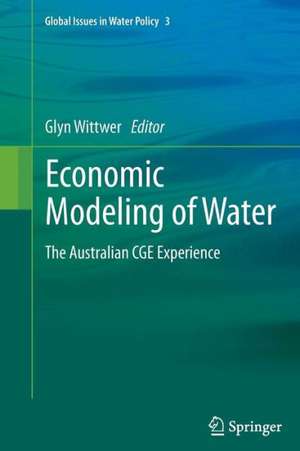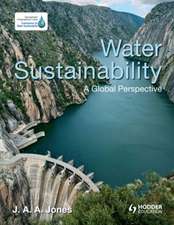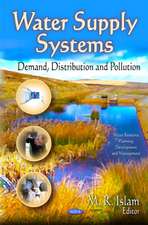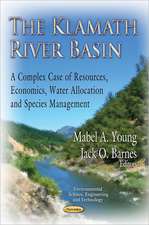Economic Modeling of Water: The Australian CGE Experience: Global Issues in Water Policy, cartea 3
Editat de Glyn Wittweren Limba Engleză Paperback – 16 apr 2014
| Toate formatele și edițiile | Preț | Express |
|---|---|---|
| Paperback (1) | 635.96 lei 6-8 săpt. | |
| SPRINGER NETHERLANDS – 16 apr 2014 | 635.96 lei 6-8 săpt. | |
| Hardback (1) | 640.88 lei 6-8 săpt. | |
| SPRINGER NETHERLANDS – 14 mar 2012 | 640.88 lei 6-8 săpt. |
Din seria Global Issues in Water Policy
- 18%
 Preț: 956.81 lei
Preț: 956.81 lei - 15%
 Preț: 645.96 lei
Preț: 645.96 lei - 18%
 Preț: 966.27 lei
Preț: 966.27 lei - 15%
 Preț: 649.87 lei
Preț: 649.87 lei - 24%
 Preț: 639.70 lei
Preț: 639.70 lei - 20%
 Preț: 574.08 lei
Preț: 574.08 lei - 19%
 Preț: 519.81 lei
Preț: 519.81 lei - 18%
 Preț: 786.36 lei
Preț: 786.36 lei -
 Preț: 432.12 lei
Preț: 432.12 lei - 15%
 Preț: 649.06 lei
Preț: 649.06 lei - 15%
 Preț: 635.15 lei
Preț: 635.15 lei -
 Preț: 395.09 lei
Preț: 395.09 lei - 18%
 Preț: 953.65 lei
Preț: 953.65 lei - 20%
 Preț: 595.16 lei
Preț: 595.16 lei - 15%
 Preț: 664.61 lei
Preț: 664.61 lei - 15%
 Preț: 643.84 lei
Preț: 643.84 lei - 24%
 Preț: 820.66 lei
Preț: 820.66 lei - 18%
 Preț: 945.14 lei
Preț: 945.14 lei - 24%
 Preț: 800.75 lei
Preț: 800.75 lei - 24%
 Preț: 685.92 lei
Preț: 685.92 lei - 19%
 Preț: 555.12 lei
Preț: 555.12 lei - 23%
 Preț: 806.97 lei
Preț: 806.97 lei - 24%
 Preț: 698.18 lei
Preț: 698.18 lei - 18%
 Preț: 959.82 lei
Preț: 959.82 lei - 18%
 Preț: 956.03 lei
Preț: 956.03 lei - 18%
 Preț: 963.91 lei
Preț: 963.91 lei - 15%
 Preț: 642.18 lei
Preț: 642.18 lei - 18%
 Preț: 960.30 lei
Preț: 960.30 lei
Preț: 635.96 lei
Preț vechi: 748.20 lei
-15% Nou
Puncte Express: 954
Preț estimativ în valută:
121.70€ • 130.13$ • 101.46£
121.70€ • 130.13$ • 101.46£
Carte tipărită la comandă
Livrare economică 18 aprilie-02 mai
Preluare comenzi: 021 569.72.76
Specificații
ISBN-13: 9789400799127
ISBN-10: 9400799128
Pagini: 204
Ilustrații: XVI, 188 p.
Dimensiuni: 155 x 235 x 11 mm
Greutate: 0.3 kg
Ediția:2012
Editura: SPRINGER NETHERLANDS
Colecția Springer
Seria Global Issues in Water Policy
Locul publicării:Dordrecht, Netherlands
ISBN-10: 9400799128
Pagini: 204
Ilustrații: XVI, 188 p.
Dimensiuni: 155 x 235 x 11 mm
Greutate: 0.3 kg
Ediția:2012
Editura: SPRINGER NETHERLANDS
Colecția Springer
Seria Global Issues in Water Policy
Locul publicării:Dordrecht, Netherlands
Public țintă
ResearchCuprins
Foreword.- Preface.- 1. Practical Policy Analysis Using TERM.- PART I: The TERM Approach.- 2. The TERM Model and its Data Base.- 3. Introducing Dynamics to TERM.- PART II: Water Modeling.- 4. Water Resources Modeling: A Review.- 5. The Theory of TERM-H2O.- 6. Buybacks to Restore the Southern Murray-Darling Basin.- 7. The Economic Consequences of a Prolonged Drought in the Southern Murray-Darling Basin.- 8. Urban Water Supply: A Case Study of South-east Queensland.- 9. Applying TERM-H2O to Other Countries.- Index.
Textul de pe ultima copertă
As anthropogenic climate change accelerates, leading both to weather unpredictability and extremes, the issue of water use and extraction has never had a higher profile. There are few places where the problems of water management are more urgent than Australia, where drought, overextraction and salinisation have become major policy concerns, and where widespread and prolonged water shortages have spawned major shifts in urban water supply policy. This volume examines economic CGE (computable general equilibrium) modeling that, while applicable to a wide array of policy issues, has in practice been deployed largely in assessing water supply and management. It focuses in part on the vital Murray Darling Basin, Australia’s most significant source of riverine water supply, where environmental restoration and regional economic needs entail a complex balancing act.
The book details the innovative TERM (The Enormous Regional Model) approach to regional and national economic modeling, and explains the conversion from a comparative-static to a dynamic model. It moves on to an adaptation of TERM to water policy, including the additional theoretical and database requirements of the dynamic TERM-H2O model. In particular, it examines the contrasting economic impacts of water buyback policy and recurring droughts in the Murray-Darling Basin. South-east Queensland, where climate uncertainty has been borne out by record-breaking drought and the worst floods in living memory, provides a chapter-length case study. The exploration of the policy background and implications of TERM’s dynamic modeling will provide food for thought in policy making circles worldwide, where there is a pressing need for solutions to similarly intractable problems in water management.
The book details the innovative TERM (The Enormous Regional Model) approach to regional and national economic modeling, and explains the conversion from a comparative-static to a dynamic model. It moves on to an adaptation of TERM to water policy, including the additional theoretical and database requirements of the dynamic TERM-H2O model. In particular, it examines the contrasting economic impacts of water buyback policy and recurring droughts in the Murray-Darling Basin. South-east Queensland, where climate uncertainty has been borne out by record-breaking drought and the worst floods in living memory, provides a chapter-length case study. The exploration of the policy background and implications of TERM’s dynamic modeling will provide food for thought in policy making circles worldwide, where there is a pressing need for solutions to similarly intractable problems in water management.
Caracteristici
Case studies explore internationally relevant policy implications Provides the full theoretical basis of a CGE model with water accounts that distinguish between dry-land and irrigation agriculture Combines localised regional analysis with broader national implications Includes detailed structural analysis as a starting point for explaining modeled outcomes










